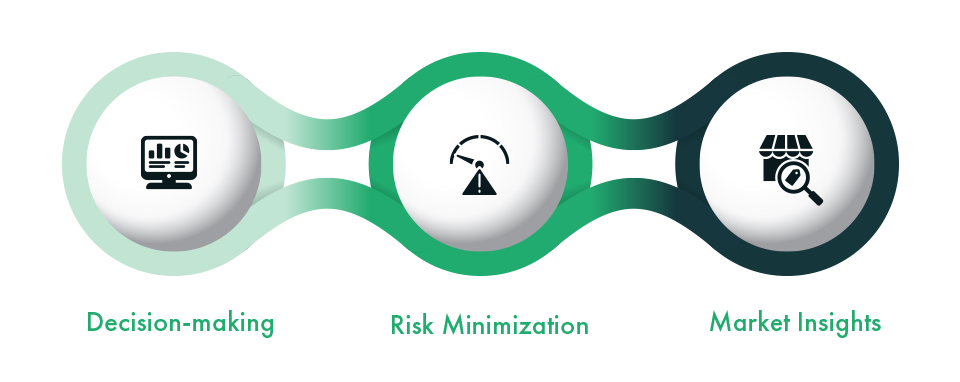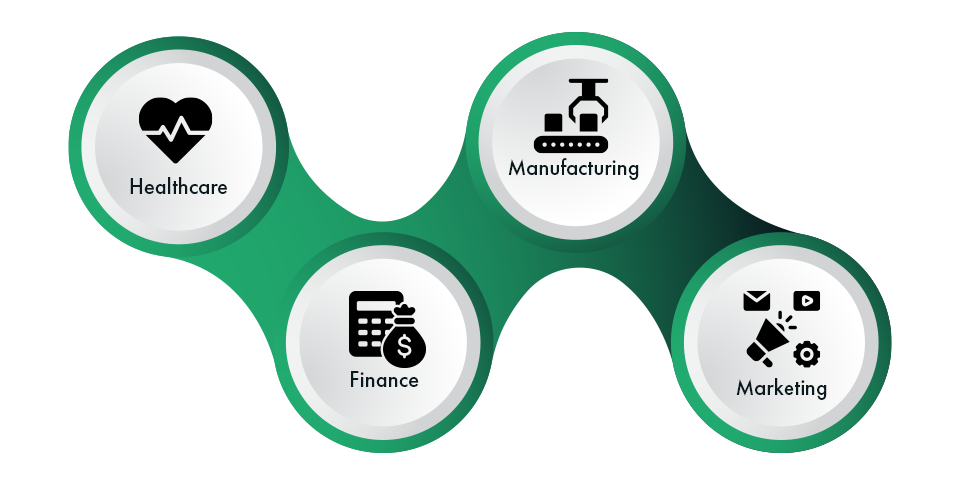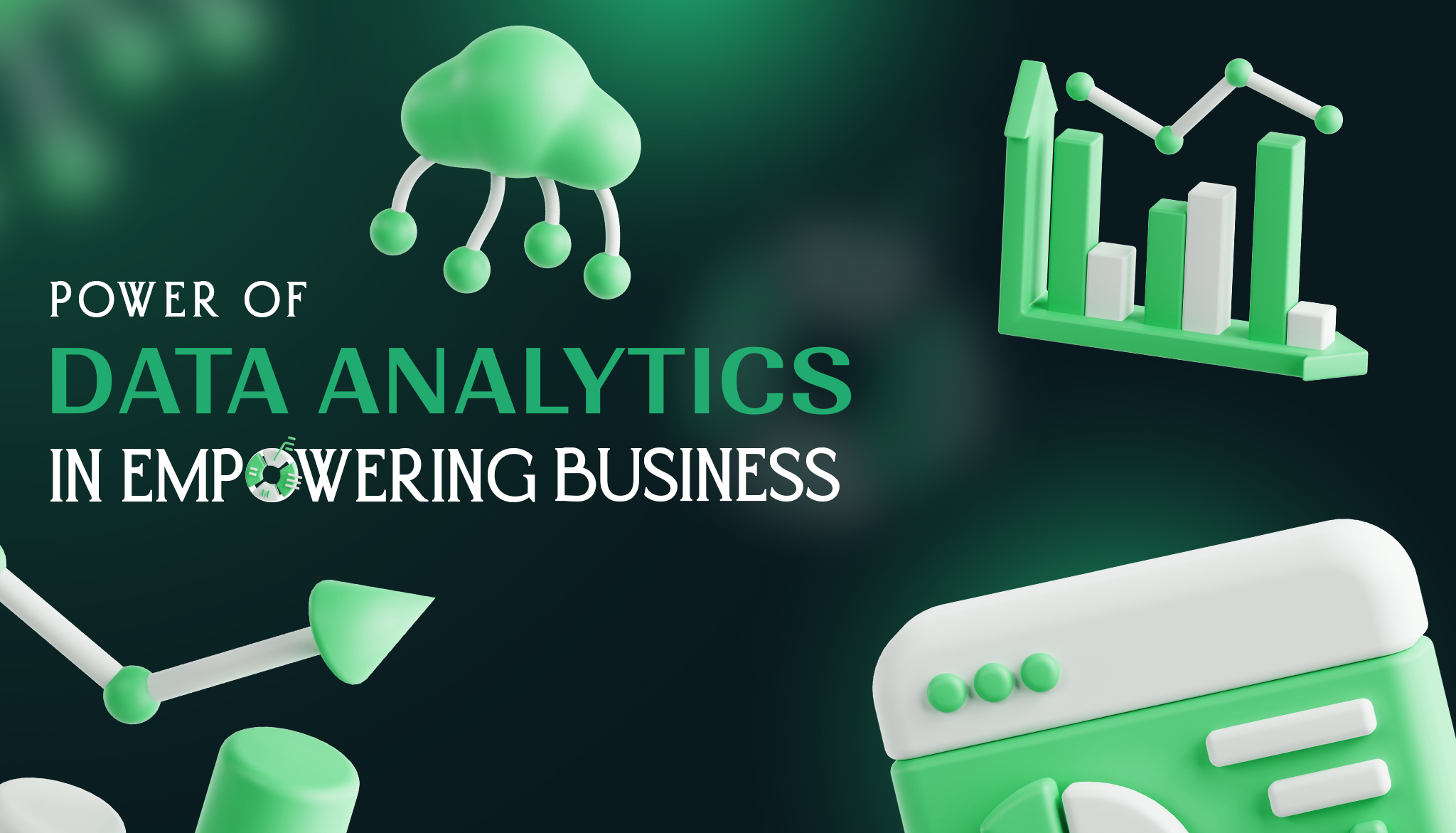Have you noticed how just talking about something near your phone makes your social media mobile apps show you related ads and posts? This shows how powerful data analytics is, helping businesses understand what people want and provide better services.
This way, by analyzing your data, companies can now understand your preferences, and create more effective marketing strategies. It allows businesses to uncover hidden patterns and trends. It gives them valuable insights that were previously out of reach.
Every business today needs to know how to turn raw data into actionable information as the competition in the business world increases. By turning complex information into simple clear insights data analytics is playing an important role for companies to increase their revenues.
Ready to unlock the power of your data?
Discover hidden insights, boost performance, and make smarter business decisions with our custom data analytics solutions tailored to your goals.
What is Data Analytics?
Data analytics is the methodical analysis of unprocessed data to derive information and insights. It analyses data, finds trends, and generates judgments using a variety of tools, approaches, and strategies.
There are four main types of data analytics:
Descriptive Analytics:
This type of analysis helps in understanding what has happened in the past by providing a clear and concise overview of the data. Making it easier to identify patterns and trends. Descriptive analysis is often the first step in data analysis, which sets the stage for further detailed analysis.
Diagnostic Analytics:
Diagnostic analytics is a deeper level of data analysis than descriptive analytics, typically represented by attributions like cause-and-effect. It is a study of data to learn about what causes different things in one way or another. It often involves data mining, correlations, and root-cause analysis, done to discover patterns and insights. For example, if sales dropped in a particular month, diagnostic analytics would help determine the cause. By identifying these underlying causes, businesses can make decisions to address issues and improve their future performance.
Predictive Analytics:
Predictive analytics uses statistical models and machine learning algorithms to predict future outcomes based on historical data. Consider an example of a stock market where you can predict the price of any stock by analyzing past data through ML models.
Prescriptive Analytics:
This provides recommendations for actions to achieve desired outcomes by combining insights from predictive analytics with decision-making algorithms such as random forest, SVM, and more.
Why is Data Analytics Important?
Businesses rely on data analytics because it delivers greater customer experience and operating efficiency insights. Companies can uncover main issues, determine customer demands, and implement data-driven initiatives through data analysis. This helps them tailor their offerings, enhance products, make operations more streamlined, and increase productivity. Ultimately, data analytics aids in propelling informed choices, competitiveness, and growth capacity.
Ways Data Analytics Empower Business
Data analytics is a decisive factor in making businesses grow these days in today’s competitive age. With data power, businesses can discover knowledge, make enlightened decisions, and streamline operations. In the forthcoming sections, let us see how data analytics benefits businesses by informing decision-making, enhancing customer experience, driving efficiencies, and bringing innovation.

Improves Customer Insights
Data analysis allows companies to derive valuable information from customer data sources like surveys, buying history, social media, and web activity. By examining the data, companies can discover customer likes, top trends, and web browsing habits. This improves customer satisfaction as companies are better able to address needs and refine customer experiences.
Effective Marketing Campaigns
Data analytics takes out a doubt in marketing and content creation by measuring real-time data. It assists companies in fine-tuning their strategies, message optimization, and targeting. Analytics tracks the campaign performance, giving insights that allow firms to tweak content and creatives, resulting in better conversion rates and avoiding ad spend waste.
Increases Operational Efficiency
Data analytics improves the operations of businesses, decreasing losses and enabling profitability. Optimized workforce scheduling, predictive maintenance, and value-added supply chain management enable improved operational efficiency through the use of these. They result in process flow smoothness, decreased downtime, and maximized overall output, ultimately boosting revenue and cutting costs.
Enhance Product Development
Data analysis fuels product innovation through insights into market trends, customer demand, and new needs. Analysis of feedback, buying patterns, and performance information helps companies perfect products or introduce new ones that are closer to what customers want. The data-driven process guarantees more success and a quicker market-fit product.
Data Analytics Drives Decision-Making
Data analytics enables companies to make clear decisions by sharing actionable insights influenced by real-time data. Using trends, patterns, and high-priority metrics, companies are able to lower risks, make predictions, and streamline strategies. The data-focused strategy enables leadership to make educated decisions that power growth, advance efficiency, and increase overall company performance.
Risk Minimization
Data analysis is a critical part of risk reduction, highlighting potential dangers and weaknesses in their early stages. Through the study of past data, trends, and behaviours, companies can forecast challenges concerning finances, processes, or changes in the market. This allows for measures like contingency planning and risk reduction, minimizing the prospect of expensive interruptions and safeguarding long-term achievement.
Market Insights
By using marketing insights, businesses can make decisions and optimize their strategy with the help of data analytics. They will be able to design marketing campaigns, forecast market trends, and use resources according to the preferences of their customers.
How To Implement Data Analytics in Your Business?
Define Your Goals:
Before straight up chasing towards data analytics, it is required for the business to clear its aims and objectives. If a business is focusing on getting the most out of data, then it should have immaculate goals, be it making the customers happy, improving the business runs, or improving sales.
Gather and Integrate Data:
Data is the most important building block in analytics, so it is necessary to gather and combine data from different sources. This data includes information about the customer, what they buy, how the business works, and other important stuff. It should be made sure that the information that has been collected is complete, correct, and up to date so that decisions can be made according to the associated data.
Pick the Best Tools and Technologies:
There are various types of ways and many different tools to work with the data, and all of them have their strengths individually. It is important to make sure that the right tools are being used for the business. Some of those tools are data visualization, predictive analytics platforms, and machine learning algorithms.
Build a Skilled Team:
Understanding data is a bit tricky, so a business needs a team of experts. This includes data scientists, analysts, and engineers who can analyze data, develop models, and interpret results. Investing in their training will help your team keep up with the newest trends and technologies.
Implement Data Governance:
Data governance is setting rules to manage the data smoothly. It is about making sure that the data is accurate and secure, and that the information can be trusted enough to make decisions.
Applications of Data Analytics in Different Industries

Healthcare:
It has a significant role to play in the healthcare industry, it helps increase operations productivity by giving data-driven records of patients, which plays a key role in patient care. These geographic information systems (GIS) for diseases help to store, visualize and analyse the geography of disease, which plays a key role in finding cures for diseases. This early diagnosis helps in taking timely precautions. In addition, the use of data analytics can help make hospital operations more efficient by decreasing patient wait times and resource distribution.
Finance:
In the financial sector, data analytics is employed to manage risk detection and prevention of fraud, as well as for customer segmentation. Using transaction data, financial institutions can spot trends that may point toward fraud and immediately stop the activity. Predictive analytics helps in assessing credit risk and making informed lending decisions. In addition, customer segmentation through analytics allows for direct financial solutions and marketing.
Manufacturing:
Data analytics is used by manufacturers to improve production processes, reduce downtime, and increase product quality. By analyzing data, companies can predict equipment failures and schedule maintenance proactively, reducing downtime and maintenance costs. Further, it aids in quality control where you can find defects and optimize production parameters.
Marketing:
Tracking customer behaviour and the performance of companies’ marketing campaigns has been made easy by data analytics. This in turn enables companies to create specific marketing strategies that resonate with the targeted audience. Through insights into campaign performance, marketers can improve their strategies and achieve better results in terms of sales.
Benefits of Data Analytics
Improved Customer Insights and Experience
It helps businesses to analyze the behaviour and preferences of their customers more effectively. This information allows companies to customize their offerings in a way that satisfies and retains customers. For instance, a retail company can offer products to customers as per their purchase pattern and make user experience better by giving them what they require.
Increased Efficiency and Cost Reduction
Operational data analysis helps organizations to find inefficiencies and save costs. Data analytics might display bottlenecks in the supply chain so companies can optimize their processes. On top of everything else, analytics can help with predictive maintenance by telling companies that equipment is going to fail and could predict downtime/repair costs.
Competitive Advantage
Data Analytics offers businesses a competitive edge They can make quicker and more informed decision-making act quickly on market changes or trends, and find new opportunities at an early stage. For example, a company using data analytics can spot emerging market trends before others, allowing them to adapt their strategies and stay ahead.
Innovation and Product Development
Data analytics allow businesses to develop new ideas by understanding the requirements of Customers and trends in the market. This helps companies to create the next wave of new products or services that their customers want. This is useful when a tech company wants to analyze data of users to make changes in their existing features & develop entirely new applications that suit their customers better.
Targeted Strategies and Marketing Campaigns
Data analytics enables businesses to create more effective marketing campaigns. It provides in-depth analysis so that companies can target the right audience. Businesses enjoy the variety in targeting, i.e., they can target their audience based on demographics, interests, and buying behaviour. This targeted approach increases the chances of sales conversion. Online Retailers can send personalized offers to customers .
Data Analytics Challenges And How To Overcome Them
Data analytics has various challenges, some of which include data quality concerns, integration issues, and data volume. Incorrect or inconsistent data can cause deceptive insights, whereas the integration of different sources of data is time-consuming and complicated. Such challenges, most of the time, deter efficient analysis and decision-making, which reflects on business performance overall.
To address these issues, companies need to spend money on data cleaning and validation tools to produce quality data. Furthermore, utilizing high-end analytics platforms that provide an integrated experience with data can increase efficiency. Having a capable data team, establishing a data-centric culture, and having effective data governance processes can also alleviate these issues to enable more consistent and actionable insights.
Time to stop guessing. Let’s use your data to win.
Harness the full potential of your data with our expert solutions, driving actionable insights that fuel growth and outsmart the competition.
Conclusion
The force of data analytics is revolutionizing business operations, providing smarter choices, greater efficiency, and improved customer satisfaction. Data can help companies streamline processes, spot opportunities, and lead the competition with analytics. Data-driven insights have the potential to change the game across all sectors of business, whether marketing or operations.
For a software development company, leveraging data analytics can lead to more tailored solutions, better project outcomes, and improved customer experiences. As businesses continue to embrace data-driven strategies, the role of data analytics will only grow, unlocking new potentials for growth and innovation across all sectors.
FAQs
A data analyst collects, processes, and analyzes data to uncover trends, patterns, and insights that help businesses make informed decisions and improve operations.
Data analytics can be challenging due to complex data processing and interpreting insights. However, with the right tools, skills, and practice, it becomes manageable and valuable.
An example of data analytics is a retail company analyzing customer purchase data to identify trends, personalize marketing, and optimize inventory for better sales and customer satisfaction.
Data analytics focuses on analyzing and interpreting data to predict trends, while business intelligence uses historical data to help businesses make informed decisions and optimize operations.


